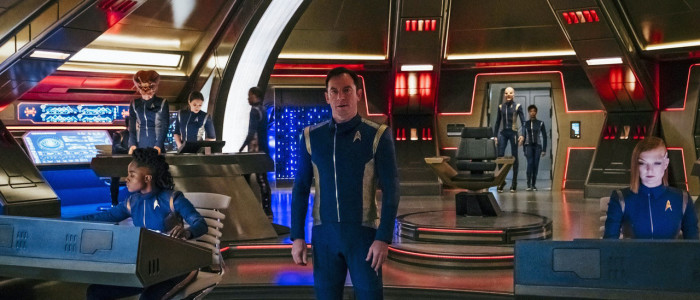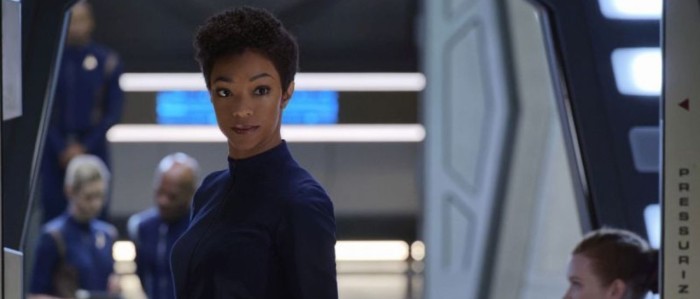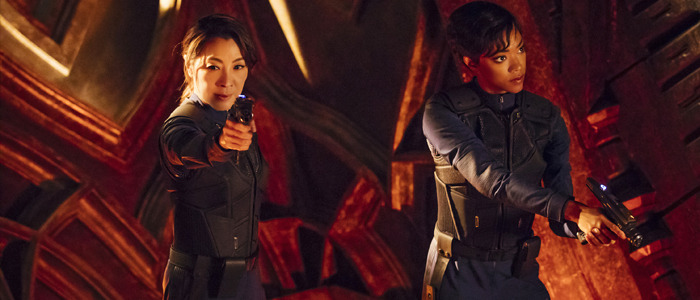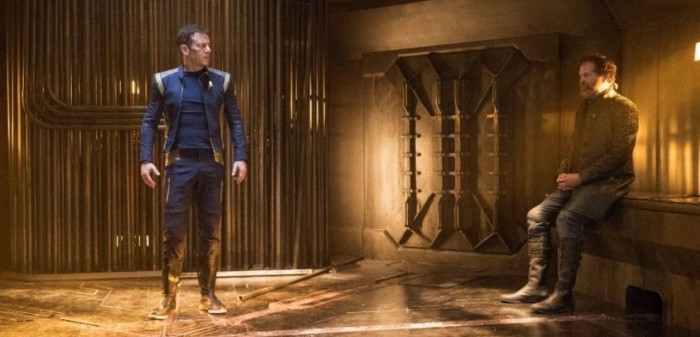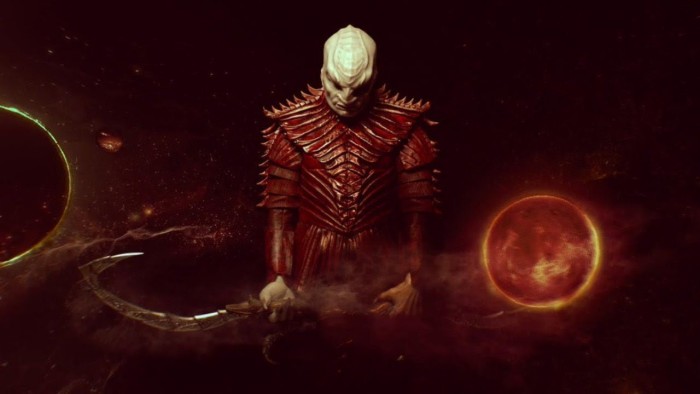'Star Trek: Discovery' Is The 'Star Trek' Show 2017 Demands
Star Trek is highly regarded as one of the most influential shows in television history. Creator Gene Roddenberry's groundbreaking (and sometimes controversial) series addressed moral and social dilemmas, the pursuit of knowledge, understanding and accepting different cultures, the importance of exploration, and hope for a better future. For over 50 years, the phenomenal sci-fi franchise has kept the dream of going boldly where no man has gone before alive and kicking.Star Trek: Discovery, the newest entry in the historically trailblazing franchise, has found a strong audience for its first season and has already been renewed. However, the series premiere began with Starfleet First Officer Michael Burnham (Sonequa Martin-Green) committing mutiny, starting an intergalactic war with the Klingons, and causing the violent death of her beloved Captain Philippa Georgiou (Michelle Yeoh). So yeah, Discovery started out a bit differently than we expected.
The general sentiment among many fans is that Discovery is a good show, but it's not a Star Trek show. While some fans are praising Discovery, others are rather disappointed, claiming that Star Trek is not supposed to be about war, violence, or killing. Many are asking what happened to Roddenberry's original vision of hope, optimism, and peaceful exploration. I'd argue that Discovery is a fresh, updated take on Rodenberry's classic ideals, modified for our modern age, which is exactly what the franchise needs right now.
Discovery Perfectly Fits Within Existing Trek Canon
Some fans feel that Discovery has no place in the Trek legacy because it's about war first. However, it's important to understand when and where the series takes place and exactly how it is tied to canon. Discovery is a direct prequel to the 1966 original, taking place 10 years earlier than the original series, before Captain Kirk, Spock, and the Starship Enterprise set out on their mission. The series maintains continuity with the older series, and more importantly, events during Discovery explain storylines in the original.
During this period (known as the Prime Timeline) the Federation (which supports democracy and civil rights for all beings) was at constant war with Klingons (an alien species known for totalitarianism and loyal supremacy). This war raged on for 70 years before a peace agreement was reached in 2293 with the Khitomer Accords. Discovery is covering new ground during a war that already exists within Trek canon. We have heard about this historical time period in previous films and series, but this is the first time we're actually seeing wartime with our own eyes.
Meet Spock’s Big Sister
The main character, Michael Burnham (Sonequa Martin-Green), is a human who was orphaned at a young age when the Klingon army attacked a Vulcan learning outpost. Spock's parents, Sarek and his human wife Amanda, took Michael in as their own child and raised her with both human and Vulcan traditions. Much like her surrogate brother, Michael has a difficult time understanding and even having human feelings as she was taught to suppress them and follow logic instead.
At NYCC, Sonequa Martin-Green explained her character's struggle, "The turmoil is visceral, I had to learn how to make sure that they (emotions) didn't hold me back and let them carve new paths of logic. Those sorts of emotional sensibilities led me to where I am now. It is also a path of redemption and the yearning for that absolution will always be there as well."
When we first meet Michael, she is a First Officer and on her way to becoming a Captain. In the first explosive episode, she commits mutiny and is stripped of her title. So far, the main storyline follows her personal quest to reconnect with her human emotions and find redemption, all while trying to unravel the mysteries of the U.S.S Discovery.
Although Michael is different than Spock, her background directly ties her to one of the most important characters that Star Trek has ever known. Both Spock and Michael personally struggle with the same problem – finding a balance between their human side and Vulcan side. Even though Spock is not in Discovery, his presence is still felt through Michael.
Breaking All the Ground
Star Trek is well known for breaking ground and paving the way to the future with a series of firsts. It was the first television show with an ethnically diverse cast, showcasing people from all backgrounds working together. Every Star Trek series since the '60s honored Roddenberry's wish for a diverse cast. It was also the first television series to cast a black female in a role of distinction. Uhura (Nichelle Nichols) was the communications officer of the Starship Enterprise and many fans regard Uhura as a true hero because her character broke the mold of African-American actresses only being cast in servant-type roles.
In the documentary Trek Nation, Gene Roddenberry expressed the importance of diversity and acceptance, "Star Trek was an attempt to say that humanity will reach maturity and wisdom on the day that it begins not just to tolerate, but take a special delight in differences in ideas and differences in life forms. If we cannot learn to enjoy those small differences, to take a positive delight in those small differences between our own kind, here on this planet, then we do not deserve to go out into space and meet the diversity that is almost certainly out there."
Star Trek: Discovery takes Roddenberry's tradition of diversity one step further than any other Trek series: women of color are in charge! Instead of the main character being a male captain (the norm, except for Captain Janeway in Voyager), the star of Discovery is Michael Burnham, a black, female officer played by Sonequa Martin-Green. Asian actress Michelle Yeoh plays the role of Captain Philippa Georgiou, who continues to heavily influence her crew and the plot even after she is murdered by a hostile Klingon.
When Brian Fuller stepped down as showrunner he spoke with EW about his dreams for the show, "I couldn't stop thinking about how many black people were inspired by seeing Nichelle Nichols on the bridge of a ship [as Lt. Uhura in The Original Series]. I couldn't stop thinking about how many Asian people were inspired by seeing George Takei [as Sulu] and feeling that gave them hope for their place in the future. I wanted to be part of that representation for a new era."
In episode four, we got a glimpse of Star Trek's first openly gay couple. Now, a TV series featuring LGBTQ characters isn't a novel idea, but it's a first for Trek, which has danced around the concept for years now. Lieutenant Stamet (Anthony Rapp) a fungal expert and scientist, is in a relationship with Medical Officer Hugh Culber (Victor Cruz). Their relationship is an important contribution to the plot, as explained by Cruz in an interview with CBS: "It enriches the storyline. The crux of my journey is how I balance my responsibilities as the ship's doctor with my responsibilities to the person I love, and how those two ideas can come into conflict."
Speaking of Conflict…
At its core, the Star Trek franchise has always reflected and commented on the state of humanity while focusing on characters dealing with social and moral dilemmas. Because we are in a currently state of war, it makes perfect sense that Discovery takes place during wartime. Our society is currently plagued with threats of nuclear conflict, drug epidemics, climate change, racism, terrorism, and women's rights. Star Trek has always been an outlet for creative minds to comment on the world around them and Star Trek: Discovery shares the same exact sentiment.
The cast of Star Trek: Discovery is hoping the series will have a significant impact on real world problems. Sonequa Martin-Green (Michael Burnham) recently said "Coming into this legacy... joining the Star Trek family and the history and the magnitude of it and being able to be a part of what I like to call 'the solution' to today's problems, I mean, there are lots of solutions but being one of them is a big deal."
In an interview with Variety, Jason Issacs (Captain Gabriel Lorca) expressed similar thoughts, "The world is complicated and horrible and I don't know how to explain to my children the insanity of the people who are in charge of it at the moment. I thought it was a good story to tell and something I would be happy to watch about presenting a vision of the world that's full of drama but also full of resolution and unity."
Just like Roddenberry's original series, Discovery deals with plenty of moral and social issues. By episode four, a few specific examples are revealed that provide commentary on real world leaders' abuse of power and enslavement of other beings.
In the premiere episode, First Officer Burnham is faced with a life-changing and ultimately life-ruining decision. Instead of listening to her Captain's orders, she commits mutiny by firing at a Klingon ship, which eventually leads to a massive war. Burnham acts on her Vulcan logic rather than her human compassion. Her mistake eventually leads to the violent murder of her Captain and the disbanding of her crew. For the rest of the season, she deals with the consequences.
Michael abused her command of force and power against an enemy without thinking it through. This exact situation can't help but feel like direct social commentary on the current climate, where thoughtless abuse of power by certain world leaders makes daily headlines. The show's writers could not have predicted current events when they were penning these episodes, but it goes to show how evergreen, and how ripe for exploration, these concepts can be.
Six months later, Michael finds herself being forced to work under Captain Lorca (Jason Isaacs) on the U.S.S Discovery instead of serving her time in jail. In just a few episodes, Michael's human emotions begin to break through and her character evolves. Now that we know Michael isn't devoid of all feeling, we start to feel for her and cheer her on. Along with her fight for redemption, she is constantly being faced with moral dilemmas put forth by her new (and mostly evil) Captain.
For example, Gabriel Lorca and his security officer capture and enslave a dangerous creature that brutally murdered Klingons on an abandoned Starfleet ship. Lorca tasks Burnham with turning the animal into a weapon. Through her own genius and exploration of the "Ripper," she discovers that the mysterious creature is a harmless, overgrown Tardigrade that is only hostile when threatened. Burnham and the Tardigrade are both misunderstood creatures, so, of course, they become friends and form a bond.
Burnham discovers that the creature feeds on and communicates with fungal spores that are scattered throughout the final frontier. Feeling overly proud of herself, she tells the crew that the Tardigrade can be used to jump the ship further than it has ever gone before. After this new method of travel is successful and saves a colony from impending Klingon doom, the poor Tardigrade is constantly being hooked up to machines and run dry until he rolls up and almost dies. We can clearly see that Burnham feels horrible about betraying the creature's trust. The last thing I expected Star Trek: Discovery to tackle was animal rights and unethical uses for living things, but here we are.
All About the Klingons
A major component of Star Trek is learning about and accepting new cultures and civilizations. Roddenberry enforced the idea of accepting one's differences in hopes that humanity as a whole will have a better future.
And Discovery sets out to teach us all about Klingon culture. Yes, they look drastically different and are only speaking in their native language, but seeing things from their point of view is new and interesting. In the original Star Trek, the Klingon race symbolized communist Russia during The Cold War. An entire race was simply introduced as the enemy and nothing more.
In Discovery, the Klingons are being presented as complex characters with a long history. From watching each episode, we get to hang out in their gargantuan ships, peek in on their military planning sessions, encounter a tragic Klingon death, and see the beginning of a Klingon romance. We even meet a badass female Klingon named L'Rell, who is just as dangerous as her male counterparts. Discovery is teaching fans that Klingons are more than just the enemy; they are a thousand-year-old civilization made up of 24 different Houses with their very own unique culture steeped deeply in faith and loyalty.
Meanwhile, Saru (played by Doug Jones), the Science Officer of the U.S.S Discovery and longtime crew mate of Michael, represents a species that is completely new to Trek. Saru is quickly becoming a fan favorite thanks to his fascinating abilities and frequent slap-in-the-face statements. He believes in Michael, but reminds her that she is still a criminal and murderer. Before Saru was freed and made it into Starfleet, his entire race was bred and preyed upon like industrial farm animals. Through bits of dialogue, we're learning more about Saru's culture; "Your world has food chains. Mine does not. Our species map is binary. We are either predator or prey. My people were hunted. Bred. Farmed. We are your livestock of old. We were biologically determined for one purpose and one purpose alone: to sense the coming of death. I sense it coming now." Now, imagine if an escaped farm animal walked up to you and introduced himself as the new Science Officer of your Starship.
Finally, Let’s Explore!
Admittedly, the first few episodes haven't seen any crew members being beamed down to explore strange new planets. However, there is a pivotal moment at the end of episode four that is all about hope, knowledge, and exploration.
Michael is paying dearly for the death of her mentor and inherent optimist Captain Philippa Georgiou, and has yet to find closure. Cadet Sylvia Tilly, Michael's neurotic roommate on U.S.S. Discovery, brings her a package to open. As soon as Michael realizes that the unexpected package contains the Last Will and Testament of Captain Georgiou she shoves it under her bed.
When Michael finds the courage to open the case (which is holding a literal and symbolic telescope), a hologram of Captain Georgiou delivers a special message that perfectly encapsulates Roddenberry's vision for Star Trek: "Hello, Michael. I hope that wherever this finds you, you are well. I imagine you have your own command now, the captain of your own ship. I have always tried to show you by example, the best way to know yourself is to know others. You are curious, a natural explorer. So, I am leaving you my most beloved possession. My hope is that you will use it to continue to investigate the mysteries of the universe, both inside and out, and keep your eyes and heart open always. Take good care, but more importantly, take good care of those in your care." Deep down Michael is a curious and hopeful leader who made a grave mistake. Captain Georgiou gave us a glimmer of hope and optimism, by reminding the "mutineer" that she is an explorer at heart.
Star Trek: Discovery is drastically different than what we have seen before, but it is still a Star Trek show beyond its title. As the series develops, Discovery proves itself as a worthy addition to the groundbreaking sci-fi franchise we all know and love. From diverse characters to its focus on social and moral dilemma, Discovery pays homage to Rodenberry's original ideals. Considering today's world is at a constant state of war, it also serves well as social commentary on current events and the human condition itself. Discovery does not abandon Roddenberry's paradigm, it has simply evolved to be a Star Trek necessary for 2017. If we have learned anything so far from this new version of Trek, it's to not judge a book by its cover.

